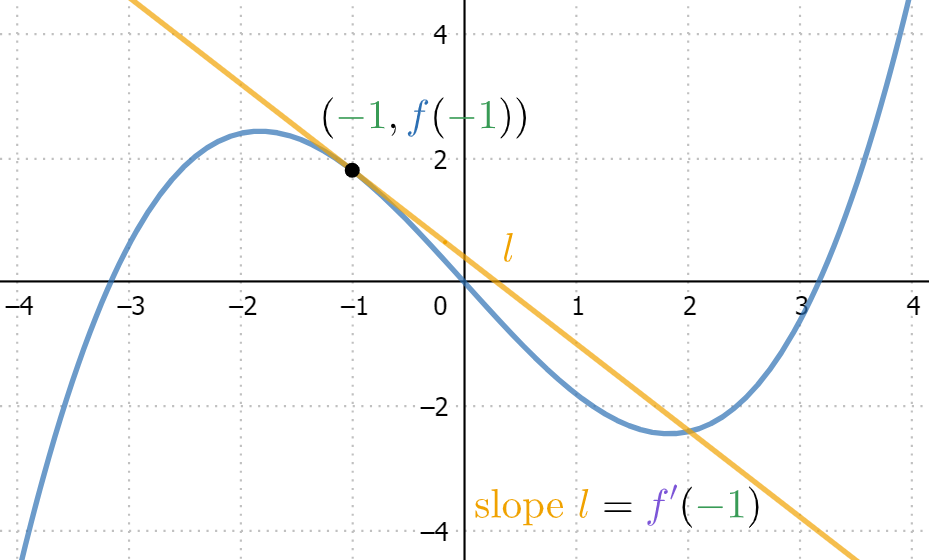Differentiation: Applications of derivatives
 Calculating tangent lines
Calculating tangent lines
Before introducing the derivative, we saw that a tangent line is a line touching the graph at a point, meaning that the line's slope equals the graph's slope at that point. Once the derivative was introduced, we saw that the slope of a function at a point equals the derivative's function value at that point.
The tangent line #\orange l# to the graph of #\blue f# at the point #x=\green{p}# is the line with slope #\purple{f'}(\green p)# that passes through the point #\rv{\green p, \blue f(\green p)}#.
Determining the tangent line is the same as determining any other line. Use the following step-by-step approach to finding the formula of a tangent line.
Determining tangent line
|
Step-by-step |
Example |
|
|
Determine the tangent line #\orange{l: y=a \cdot x+b}# to the graph of #\blue f# at the point #x=\green{p}#.
|
#\qqquad \begin{array}{rcl}\blue{f(x)} & = & \blue{x^3-5 \cdot x^2+1} \\ x & = &\green{3}\end{array}# |
|
| Step 1 |
Calculate #\blue f(\green p)# to find the #y#-coordinate of the point through which the tangent line passes. |
#\qqquad \begin{array}{rcl}\blue{f}(\green 3) &=& -17 \end{array}# |
| Step 2 |
The slope #\orange a# of the tangent line is equal to #\purple{f'}(\green{p})#. Determine the derivative #\purple{f^{\prime}}# and substitute #x=\green p# into #\purple{f'}(x)# to evaluate #\purple{f'}(\green p)#. |
#\qqquad \begin{array}{rcl} \purple{f'(x)} &=& \purple{3 \cdot x^2-10 \cdot x} \\\purple{f'}(\green3) &=&\orange{-3} \end{array}# |
| Step 3 |
Line #\orange l# has formula #\orange{y=} \purple{f'}(\green{ p})\orange{\cdot x+ b}#. Determine #\orange b# by substituting the point #\rv{\green p, \blue f(\green p)}# into this formula. |
#\qqquad \begin{array}{rcl}-17&\orange{=}&\orange{-3 \cdot} \green{3} \orange{+b}\\ \orange{b} &\orange{=}&\orange{-8}\end{array}# |
| Step 4 |
Substitute the value we found for #\orange b# into the formula of the tangent line #\orange l#. |
#\qqquad \begin{array}{rcl}\orange {l: \ y} & \orange{=} & \orange{-3 \cdot x-8}\end{array}# |
Give your answer in the form #y=a\cdot x + b#.
We follow the step-by-step plan for finding the formula of the tangent.
| Step 1 |
We determine #f(3)# to know the #y#-coordinate of the point where the tangent line passes. \[f(3)=\left(3\right)^3+\left(3\right)+7=37\] So the tangent goes through the point #\rv{3, 37}#. |
| Step 2 |
We calculate the slope of the tangent line. To do this, we first calculate #f'(x)#. The function #f(x)=x^3+x+7# is a polynomial. We can calculate the derivative of a polynomial by using the sum rule and the derivative of the power function: \[\dfrac{\dd}{\dd x} a x^n =a \cdot n x^{n-1}\] For the function #f(x)#, we then find the derivative: \[ f^{\prime}(x) = 3\cdot x^2+1 \] We now find the slope of the tangent line by substituting #x=3# into the derivative. \[f'(3)=3\cdot \left(3\right)^2+1=28\] |
| Step 3 |
We determine the #y#-intercept #b# of the formula of the tangent line. In step 1, we determined that the tangent line passes through the point #\rv{3, 37}#. We now substitute this point into the formula of the tangent line #y=28\cdot x+b# and solve the resulting equation #37 = 28\cdot \left(3\right)+b # for the unknown #b#, giving \[ b=-47 \] |
| Step 4 |
Entering the calculated slope and #y#-intercept gives the formula for the tangent line: \[y=28\cdot x-47\] |

Or visit omptest.org if jou are taking an OMPT exam.




